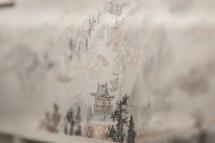



From a distance
The term woyou ("lie down and travel") was used in ancient China to describe the vivid feeling brought on by a fine mountain-and-water painting. Appreciating such artwork was to help simulate an immersive experience of landscapes. Extensive and Moist, an exhibition at the Beijing Fine Art Academy, through Sunday, shows dozens of ink landscape paintings by Wen Xiang that make viewers feel like they are in a similar environment, especially as traveling is restricted due to the pandemic. Wen was born in a family of intellectuals and artists. He began delving in fine arts in childhood. Years later he worked for a brief period at the Palace Museum in Beijing, studying ancient artworks and handicrafts. The exhibition navigates the evolution of Wen's art through the decades. The museum's first floor shows his copies of great paintings in history, a way for him to understand the energy and atmosphere that ancient artists tried to communicate. Wen visited Japan in 1991 and conducted cultural exchanges. While he taught classic Chinese painting and furniture design there, he befriended several Japanese artists. He created paintings and took photos reflecting the influence of Japanese aesthetics, which are also on show. After returning to China, Wen continued to seek breakthroughs. He researched Chinese history, architecture and handicrafts, and tried to form "spiritual connections "with scholars and artists from the Song Dynasty (960-1279). His most recent paintings on display reflect such efforts to take his creation to a higher level.
9 am-5 pm, closed on Mondays. 12 Chaoyang Gongyuan (Park) Nan Lu. 010-6502-5171.

Unity with nature
Learning from the rules of the universe and achieving a state of harmony between humans and nature were at the heart of depictions of natural landscapes and living things in classic Chinese painting. Through such works ancient painters and viewers sought spiritual freedom. And appreciating these paintings allow people a glimpse into the minds of artists and intellectuals of the past, and be lost in quiet contemplation of the ultimate relation between humans and the cosmos. Forests and Streams Resplendently Clear, a long-term exhibition at Tsinghua University Art Museum, addresses this fascinating and thought-provoking aspect of Chinese art. The exhibition, opened last year to mark Tsinghua University's 110th anniversary, gathers ink-color paintings from the collections of museums and private assemblies. The works are not only a celebration of the splendor of nature and the dynamics of living things-birds, flowers, fish and insects-but also open discussions about forming an ideal way of living, which, according to ancient intellectuals, should be leisurely and artistically enriched. The paintings show people surrounded by mountains and waters, or relaxing in carefully designed gardens, an artificial enactment of nature while enjoying cultural activities. By doing so, ancient Chinese believed they could realize a state of freedom and spiritual satisfaction, and a unity with the universe.
9 am-5 pm, closed on Mondays. Tsinghua University, Haidian district. 010-6278-1012.

Carefree style
Presenting a mentality of self-satisfaction has been central to the work of artist Ziqing Yimu. He believes to achieve that goal, it doesn't mean total relaxation and overindulgence but being focused on and committed to something one cares about, like painting in his case. The Ici Labas art gallery in 798 Art Zone, Beijing, is showing more than 20 of Ziqing's paintings at his solo exhibition, The Weight of Being Self-satisfied. In his work, Ziqing utilizes his creativity and energy in the pursuit of the ultimate state of sincerity and perfection. He adopts semi abstract and abstract approaches to find an undisciplined and yet organized pattern in his vivid output. He says painting is like a ray of light for him to explore the most intimate parts of his heart and soul, and to help him find the reason why he has to paint. The exhibition runs through Aug 7.
10:30 am-6 pm, closed on Mondays. East Street, 798 Art Zone, Beijing.130-0117-0598.
If you have any problems with this article, please contact us at app@chinadaily.com.cn and we'll immediately get back to you.